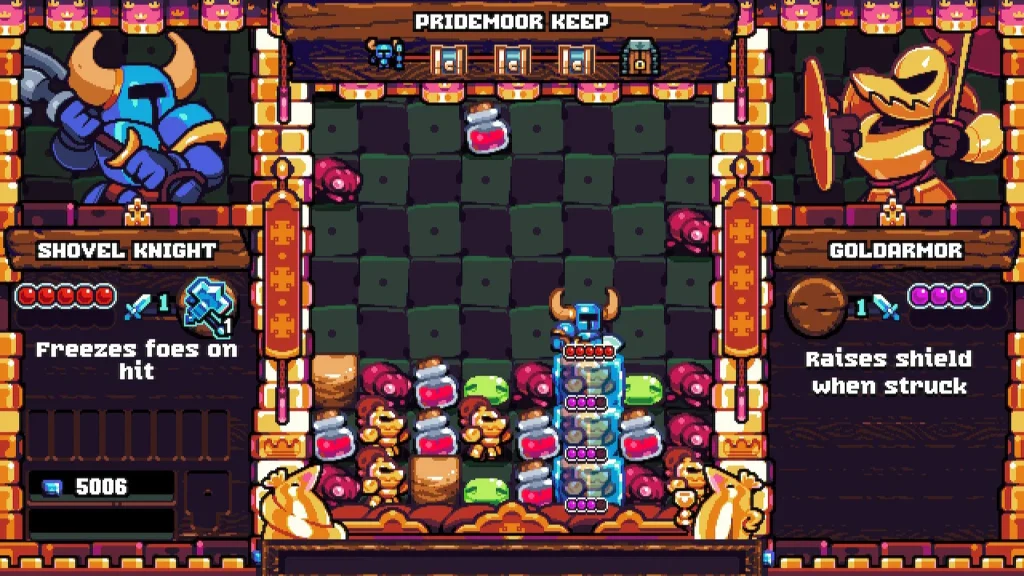

Game Reviews
Shovel Knight Pocket Dungeon Digs Up a New Genre
Shovel Knight Pocket Dungeon is more than a mere spinoff.
Shovel Knight Pocket Dungeon Review
Developer: Yacht Club Games, Vine | Publisher: Yacht Club Games | Genre: Puzzle, Roguelike, Dungeon Crawler | Platforms: Nintendo Switch, PlayStation 4, PC | Reviewed on: PC
With Shovel Knight Pocket Dungeon, Yacht Club Games is breaking new ground. Created in collaboration with solo developer Vine, Pocket Dungeon finds the Shovel Knight franchise venturing away from the side-scrolling retro platformer it has become known for: this spinoff blends block-matching puzzle mechanics with roguelike dungeon crawling elements, resulting in a gameplay loop unlike anything else on the market–essentially a new genre of its own. It may take some getting used to, but for those who take the time to meet it on its own terms, Pocket Dungeon emerges as an endlessly addictive brainteaser that puzzle and roguelike fans can’t afford to miss.
Pocket Dungeon sees the eponymous shovel-wielding hero trapped inside a mysterious cube that transports him to the world of the “pocket dungeon,” an otherworldly realm filled with a never-ending sequence of bite-sized dungeons. Shovel Knight won’t be able to dig his way out of this conundrum like he normally would; instead, he teams up with the mysterious Puzzle Knight, along with an expansive cast of additional new and returning characters from the Shovel Knight lore, to get to the root of what’s causing all this chaos. This tale is told with Yacht Club’s signature punny humor and relentless charm, and while it may not have all the same emotional resonance of some previous Shovel Knight stories, Pocket Dungeon’s upbeat plot and writing add a welcome dimension to the rampant puzzling.

Perhaps it shares its attitude and style with other Shovel Knight games, but Pocket Dungeon dramatically departs from previous titles in its gameplay. Whenever you set out on your quest from your hub camp, you’re ushered into a series of distinct, randomized levels, each of which is contained within a single screen; enemies and obstacles gradually descend from the top of the screen like blocks in a Tetris-style game, and it’s your job to clear them out before they reach the top. If you can line up multiple enemies of the same type (such as by getting five Goldarmor knights in a row), attacking one enemy will damage the whole row. This combo mechanic is crucial to surviving some of the game’s later levels, which introduce increasingly devious obstacles and stronger enemies.
On top of these dynamics, each time you hit an enemy will also deal some damage to yourself, requiring you to meticulously plot out every single movement to ensure that you don’t accidentally spell your own doom. Throw in intermittent boss battles and stage hazards, and Pocket Dungeon can easily (and quickly) get chaotic. That’s not to mention that, as in any true roguelike, every death will send you hurtling back to the start of the world map if you lose a life (although you can eventually unlock the ability to start each run from later levels).

With all these mechanics at play, Pocket Dungeon certainly gives players a lot to process. It can be difficult to get the hang of it at first, given how dramatically it departs from most other similar games on the market. Fittingly enough, then, you may even find yourself struggling through the first few dungeons if you try to play it like any other puzzler or dungeon crawler on the market: Pocket Dungeon requires methodical and careful strategies to build massive combos, but it also demands constant speed and efficiency to keep clearing out rows before they stack up to the top of the screen. Difficult as that may sound, though, Pocket Dungeon’s early tutorials do an excellent job easing the player into the game’s many mechanics, and after perhaps an hour or two of experimentation, the gameplay loop naturally settles into an intuitive and engaging flow.
Breaking up the normal loop are the many secrets players can uncover in Pocket Dungeon’s compact screens. Even in the hub camp, each frame is packed with hidden trinkets and invisible doorways. Meanwhile, the pocket dungeons themselves also teem with easter eggs like randomized items that be used in combat or void portals that transport players to isolated rooms packed with treasure. Pocket Dungeon isn’t just about racking up the highest possible scores, then—it instead celebrates players who take the time to uncover the hidden quirks of each environment.

The way the game incorporates themes from other Shovel Knight titles further develops the gameplay loop, thanks to its varied selection of 10 different playable characters and ample selection of powerups. Each character boasts unique mechanics based on their presentation in other Shovel Knight games: Shield Knight can block one fatal blow, for example, while Mole Knight can burrow underground and switch places with enemies. Although these characters may not be evenly balanced—King Knight’s ability, which bashes enemies to deal double the attack power at the cost of extra damage, offers limited usefulness at best—their varying mechanics allow for wildly different gameplay styles and strategies. If you find yourself getting stuck in one section as Shovel Knight, it’s always worth trying again as Specter Knight, King Knight, or any other character to see if their abilities provide just what you need to keep pushing forward.
Its character roster isn’t the only way Pocket Dungeon supports diverse playstyles. Rather, the game comes packed with an expansive suite of accessibility options for Pocket Dungeon that allow players to customize nearly every facet of the experience: you can choose to play with unlimited lives, reduce the speed at which enemies fill the screen, boost the amount of damage your attacks deal, and even turn off boss battles altogether, to name only a few options. Although taking advantage of some of these accessibility features will disable achievements, their inclusion nonetheless provides a welcome tool for players to customize the game to their needs and preferences. Pocket Dungeon can be uncompromising in its default settings, so even players who rarely tinker with accessibility options may want to give them a shot and see how the gameplay loop can change.
/f/93161/1920x1080/dc0a33cce1/screenshot-4-campfire.png)
Pocket Dungeon may not be a music game, but there’s an undeniable rhythmic quality to its gameplay. As you delicately gauge each enemy’s health, connect as many enemies into groups as possible, and gradually clear out rows as you chart your path through the clustering chaos of the screen, it’s easy to settle into a meditative flow. With its marriage of the roguelike and puzzle genres, Pocket Dungeon not only encompasses both gameplay styles’ distinct mechanics, but also captures the most satisfying things about them, too: it boasts the visceral satisfaction of clearing out a massive row while also featuring the adrenaline of managing a lengthy run in a roguelike.
Better yet, there’s more than a healthy serving of content here. The main campaign already boasts plenty of unique dungeons that change with every run thanks to roguelike randomization, but additional modes provide even more extra material. The local two-player competitive mode is a special highlight, along with a daily challenge mode that offers a new challenge each day to encourage players to keep coming back. While the story can be completed quickly depending on your skill level, the game offers enough additional challenges to keep players returning for hours and hours on end.

It certainly helps that the game is nothing short of a delight to behold. Its pixelated graphics are chunky, compact, and strangely adorable, with every sprite bursting with character and personality. On top of that, Pocket Dungeon contains an immaculate soundtrack composed by the original Shovel Knight composer himself, Jake Kaufman, featuring a mix of all-new tunes and high-octane remixes of melodies from previous games. The presentation secures Pocket Dungeon an identity all its own while providing plenty of fanservice for longtime players of Yacht Club’s signature franchise.
Shovel Knight Pocket Dungeon, all told, is a far cry from any other Shovel Knight game before it. Yet for all its differences, it is no mere spinoff—both in its story and its gameplay, it deserves a place right alongside every other mainline entry in the series. Yacht Club and Vine have accomplished something truly impressive here, an all-new genre that’s sure to delight fans of roguelikes and puzzle games in equal measure. Don’t let the unfamiliarity deter you from digging into everything these pocket dungeons have to offer.

-

 Features4 weeks ago
Features4 weeks agoGet Ready: A Top Isekai Anime from the 2020s Is Headed to Hulu!
-

 Features4 weeks ago
Features4 weeks agoSocial Gaming Venues and the Gamification of Leisure – A New Era of Play
-

 Features3 weeks ago
Features3 weeks agoSolo Leveling Snubbed?! You Won’t Believe Who Won First at the 2025 Crunchyroll Anime Awards!
-

 Culture3 weeks ago
Culture3 weeks agoThe Global Language of Football: Building Community Beyond Borders
-

 Technology4 weeks ago
Technology4 weeks agoIs Google Binning Its Google Play Games App?
-

 Technology4 weeks ago
Technology4 weeks agoHow to Download Documents from Scribd
-

 Guides4 weeks ago
Guides4 weeks agoBoosting and WoW Gold: Why Prestige and Efficiency Drive the Modern MMO Player
-

 Technology2 weeks ago
Technology2 weeks agoGamification and Productivity: What Games Can Teach SaaS Tools
-

 Features2 weeks ago
Features2 weeks agoFarewell to a Beloved 13-Year-Old Isekai Anime That Brought Us Endless Laughter
-

 Features1 week ago
Features1 week agoThis Upcoming Romance Anime Might Just Break the Internet; Trailer Just Dropped!
-

 Features3 weeks ago
Features3 weeks agoWait, What?! Tom & Jerry Just Turned Into an Anime and It’s Glorious!
-

 Culture2 weeks ago
Culture2 weeks agoIs the Gaming Industry Killing Gaming Parties?






















